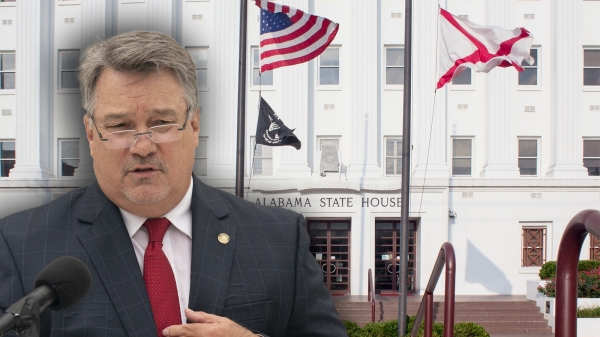From the Office of Attorney General Luther Strange
MONTGOMERY–Attorney General Luther Strange said today he is pleased that the Alabama Legislature gave approval to seven bills in a package that he advocated to strengthen and support law enforcement in Alabama. These include bills to regulate synthetic marijuana, to preserve citizens’ rights and the integrity of legal proceedings, to combat looting, and to protect law enforcement officers.
“The success of our legislative package is a tribute to law enforcement officers throughout our great state,” said Attorney General Strange. “It is my honor as Attorney General to meet with these fine men and women, and as I do so, I continue to be impressed and grateful for their dedication to protect our citizens and enforce our laws. Because they cared and expressed their concerns to me, together we have been able to bring major reforms that will help law enforcement in the performance of their vital duties.”
Attorney General Strange stated, “I especially want to thank the members of the Alabama House of Representatives and the Senate who worked tirelessly to keep these bills moving and to achieve their final passage. On behalf of the citizens of Alabama, I want to thank them for a job well done.”
On March 22, the Legislature gave final approval to House Bill 17, dealing with false instruments that may be filed against public officials or law enforcement to hinder rightful claims to their property, and providing a process to facilitate the legitimate cancellation of such claims. This bill was sponsored by Representative Blaine Galliher who secured House passage and once the bill arrived in the Senate, Senator Cam Ward (who sponsored the companion bill) guided it to final passage.
Final passage of legislation to ban synthetic drugs came on April 26. Senate Bill 208 and House Bill 158 changed the law to now regulate synthetic marijuana and other similar substances. Synthetic substances that mimic marijuana or other drugs, often referred to as “spice,” “bath salts” or various other names, are created with chemical compounds which had not been identified and prohibited as controlled substances under state law. The State Department of Public Health previously has taken regulatory action regarding this, and now the classification of the chemicals and chemical compounds as controlled substances under state law gives law enforcement stronger tools to combat their abuse. Sponsors were Representatives Allen Farley and Randy Wood and Senator Arthur Orr.
A significant victory was achieved on May 2 when an important compensation was restored for law enforcement officers, firefighters and correctional officers who sacrifice long hours in hard and dangerous work. House Bill 255 changed the law to allow the calculation of overtime pay toward their retirement benefits. Sponsors were representative Jay Love and Senator Jabo Waggoner.
The next day, on May 3, final passage of a looting bill was lauded as a tribute to those who have struggled through the devastating tornadoes that have struck Alabama just over a year ago. Attorney General Strange developed this legislation based on discussions within the Attorney General’s Law Enforcement Advisory Committee and the law enforcement officers’ recommendations for better tools to combat looting. Under previous law, Alabama has not had a crime specific to looting, and the existing laws against burglary, theft and trespassing have not been adequate to fight the looting that becomes epidemic during times of disaster. Now the law specifically criminalizes looting and makes it a class C felony, which is punishable by one to 10 years imprisonment and a fine of up to $15,000. Sponsors were Representative John Merrill and Senator Gerald Allen.
May 8 brought the final passage of three more law enforcement bills in the Attorney General’s legislative package:
House Bill 99, sponsored by Representative Randy Wood, will protect law enforcement personnel and other Alabamians from sham legal proceedings. Representative Wood achieved swift passage out of the House and Senator Cam Ward was instrumental in securing final passage in the Senate. Attorney General Strange included this bill in his legislative package upon the strong recommendation of members of law enforcement to fight such efforts to intimidate or hinder officers in the discharge of their duties.
Senate Bill 91 provides tough penalties for the disarming of a law enforcement officer. Previously, state law provided no specific crime for disarming a law enforcement or corrections officer. This bill makes it a class C felony to intentionally remove a firearm or weapon, or to deprive a law enforcement or corrections officer of its use when the officer is acting within the scope of his duty and the person reasonably should have known that it was a law enforcement or corrections officer. Sponsors were Senator Tammy Irons and Representative Lynn Greer.
House Bill 278 will combat the proliferation of metal theft in Alabama. This legislation arose from concerns expressed to the Attorney General by manufacturers, secondary recyclers, businesses, law enforcement, church leaders, and others who have been impacted by metal theft. It provides for a statewide digital database to be created and maintained by the Alabama Criminal Justice Information Center. In addition, the bill increases criminal penalties, puts limits on transactions, and provides other safeguards. Sponsors were Senator Ben Brooks and Representative Bill Poole.
Attorney General Strange commended his legislative director, Suzanne Webb, and his law enforcement coordinator, Louis Zook, for their work in obtaining the passage of these important new laws.























































